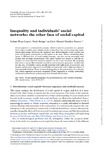Inequality and Individuals’ Social Networks: The Other Face of Social Capital

Ver/
Use este enlace para citar
http://hdl.handle.net/2183/28273
A non ser que se indique outra cousa, a licenza do ítem descríbese como Atribución-NoComercial 4.0 Internacional
Coleccións
- GI-OSIM - Artigos [35]
Metadatos
Mostrar o rexistro completo do ítemTítulo
Inequality and Individuals’ Social Networks: The Other Face of Social CapitalData
2021Cita bibliográfica
Atilano Pena-López, Paolo Rungo, José Manuel Sánchez-Santos, Inequality and individuals’ social networks: the other face of social capital, Cambridge Journal of Economics, Volume 45, Issue 4, July 2021, Pages 675–694, https://doi.org/10.1093/cje/beab016
Resumo
[Abstract] Social capital is a controversial concept, which is used in economics as a generic
form of pro-sociality and a simple means to introduce the social context into mainstream approaches. However, the accepted view underestimates social conflict and
does not properly characterise social capital as an asset. When considering these
issues, a different face of social capital emerges, one that can be associated with
closure and privilege maintenance. This paper studies how access to and the extraction of social network resources depend on the social structure. By analysing
data from a survey that included a position and a resource generator, we find that
for the case of Spanish society, people endowed with high levels of economic and
human capital enjoy improved accessibility and networks with a high prevalence of
instrumental relations. There is essential inequality in the endowment of social capital, which augments economic inequality. When inequality is socially embedded,
traditional redistributive policies may have limited effectiveness.
Palabras chave
Social capital
Inequality
Social stratification
Lin’s model
Bourdieu
Inequality
Social stratification
Lin’s model
Bourdieu
Descrición
Financiado para publicación en acceso aberto: Universidade da Coruña/CISUG
Versión do editor
Dereitos
Atribución-NoComercial 4.0 Internacional
ISSN
1464-3545






